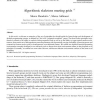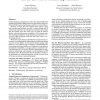1972 search results - page 133 / 395 » Evolutionary algorithms and dynamic programming |
PC
2006
15 years 2 months ago
2006
In this work, we discuss an extension of the set of principles that should guide the future design and development of skeletal programming systems, as defined by Cole in his ``pra...
126
click to vote
EUROGP
2007
Springer
15 years 6 months ago
2007
Springer
Abstract. When researchers make alterations to the genetic programming algorithm they almost invariably wish to measure the change in performance of the evolutionary system. No one...
166
click to vote
FPL
2010
Springer
15 years 13 days ago
2010
Springer
We demonstrate how Field Programmable Gate Arrays (FPGAs) may be used to address the computing challenges associated with assembling genome sequences from recent ultra-high-through...
114
Voted
FSEN
2009
Springer
15 years 9 months ago
2009
Springer
We present a general technique for extending Java-like languages with dynamic overloading, where method selection depends on the dynamic type of the parameter, instead of just the ...
147
click to vote
POPL
2012
ACM
13 years 10 months ago
2012
ACM
Gradual typing lets programmers evolve their dynamically typed programs by gradually adding explicit type annotations, which confer benefits like improved performance and fewer r...


